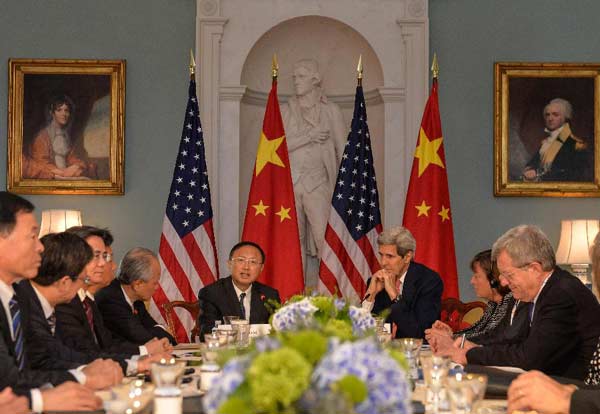Recalibrating the 'Pivot to Asia'
- By Dan Steinbock
 0 Comment(s)
0 Comment(s) Print
Print E-mail China.org.cn, June 26, 2015
E-mail China.org.cn, June 26, 2015
|
Chinese State Councilor Yang Jiechi (L, back) and US Secretary of State John Kerry (R, back) co-chair a special session on ocean protection under the framework of the seventh China-US Strategic and Economic Dialogue (S&ED) in Washington D.C., the United States, on June 24, 2015. [Xinhua Photo] |
After months of diplomatic friction over the South China Sea, both sides acknowledged an easing of tension in the run-up to the seventh meeting of the Sino-U.S. Strategic and Economic Dialogue (S&ED).
It was also reflected in the Pentagon meeting between U.S. Secretary of Defense Ashton Carter and China's Central Military Commission Vice Chairman General Fan Changlong.
The fifth Strategic Security Dialogue (SSD) served as a prelude to the S&ED.
The S&ED advancements
As the Sino-U.S. relationship is growing broader and deeper, the dialogue offers a way to sustain bilateral cooperation, despite differences.
That was evident in the strategic talks between Secretary of State John Kerry and State Councilor Yang Jiechi; and in the economic negotiations between Treasury Secretary Jacob Lew and Vice Premier Wang Yang.
As the two nations agreed to work to complete a code of conduct on cyber activities, they also widened the scope of discussions by adding new sections to their annual dialogues and consultations.
Moreover, the dialogue paved the way to President Xi Jinping's upcoming visit to the United States in the fall.
Although the S&ED began amid U.S. concerns about cyber-hacking, territorial disputes and economic issues, it also occurred as Chinese companies' direct U.S. investment has increased fivefold since 2009. That has added more than 80,000 jobs in America, as Vice Premier Wang Yang noted in his Wall Street Journal op-ed.
Today, Chinese investments in the United States total almost US$50 billion and are likely to increase to between US$100 billion to US$200 billion by 2020. That translates to 200,000-400,000 jobs in America.
During the S&ED talks, the most intriguing developments involved not just the progress that took place, but the undercurrents that could precipitate subtle shifts in the U.S. policy approach to China.
Fostering economic and strategic success in Asia
Surprisingly, the White House decided against a meeting with General Fan Changlong during his five-day meeting trip to Washington, despite the Pentagon's recommendation that it go ahead.
Most observers argued that that the White House was motivated by domestic pressures, due to U.S.-Sino differences regarding about the South China Sea. However, the meeting that never materialized may have contributed to the ongoing rethink about the Obama foreign policy – particularly the administration's pivot to Asia – in both Democratic and Republican camps.
There are those who believe that free trade in the Asia Pacific region is very much in the U.S. and Chinese interest; but that both nations should be participants in the evolving trade blocs in the region. By the same token, there are many who believe that the China-proposed Asian Infrastructure Investment Bank (AIIB) is not a threat against but complementary to the U.S. interests in the region.
Some policy authorities believe that U.S. pivot should be "recalibrated," although this view is typically expressed in more diplomatic terms.
It is a view that unites moderate Democratic internationalists and longtime Republican multilateralists, from Henry Kissinger to pragmatic presidential contenders like Jeb Bush. As Jeffrey A. Bader, a veteran Brookings analyst, has recently argued, there are valid reasons to argue that America's China policy is changing and it is time to ask, as he does: "Are we in search of enemies?"
Until recently, eight U.S. presidents since Richard Nixon have rejected the idea of inevitable hostility and an across-the-board rivalry between the United States and China.
A generation of peace in Asia was made possible by such statesmen in America and their counterparts in China. That tradition should be sustained.







Go to Forum >>0 Comment(s)